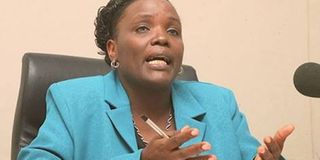Prepare strong policy to bolster education

Prof Joyce Ndalichako is Minister of Education, Science, Technology and Vocational Training.
What you need to know:
- Do we gloss over the fact that quality education is the driver of all sectors? It seems we are simply contented with going to school unmindful of whether what we learn is useful.
What is wrong with Tanzania’s education edifice? Why have employers been complaining that many of college and university graduates are unskilled, yet we have done nothing to improve the situation?
Do we gloss over the fact that quality education is the driver of all sectors? It seems we are simply contented with going to school unmindful of whether what we learn is useful.
Reports that the Ministry of Education, Science, Technology and Vocational Training has ordered heads of private schools to let pupils or students, who failed to reach certain pass marks to continue with their studies are debatable.
The ministry insists such children should be taught to master subjects instead of forcing them to repeat classes. But that is easier said than done. They may need more time to catch up than what the ministry thinks.
It is a pity that some education ministers, on different occasions, have unilaterally made controversial announcements, scrapped subjects or merged them with others or changed grading systems, without improving value. It has been an endless experimentation, with the education system going down the drain.
Complaints have been swirling that some children in public secondary schools are unable to write, read or do simple arithmetic. With more than a decade of independence, Tanzania is supposed to have come of age and use its citizens’ knowledge adequately to fight its sworn enemies: illiteracy, disease and poverty. Sadly even the purpose of education is lost unlike the era of Ujamaa, when self-reliance was a clear policy. In fact, many Tanzanians nowadays only learn to pass examinations. Even some of educated Tanzanians are involved in looting public wealth. Corruption is ingrained in society. It has become one of our biggest enemies.
Youth who see nothing wrong with soliciting bribes
A survey commissioned by the East African Institute last year showed that 60 per cent of the Tanzanian youth believe it did not matter how one made money provided one did not end up behind bars. The study also revealed that 44 per cent of young people could easily take or give a bribe. Still, we seem to trivialise matters. Much as we acknowledge the government initiatives of providing primary and secondary education free of charge, a clear, predictable and friendly education is needed for private schools also to operate well.
We are aware that mass pupil enrolment has strained government resources. In some regions, enrolments of Standard One pupils have doubled compared to last year’s, putting considerable pressure on local governments to construct new classrooms. Arusha Region faces a shortage of 1,321 classrooms for public primary schools and 118 classrooms for public secondary schools. Dodoma Region is short of 950 classrooms for public primary schools and 50 classrooms for secondary schools this year.
In Mwanza, not all 43,536 secondary school students selected to join Form One this year may begin their education due to a shortage of 923 classrooms.
Dar es Salaam Region has a shortage of 400 classrooms to accommodate 51,488 pupils. Let’s draw up a strong policy and invest heavily to get out of education quagmire.



